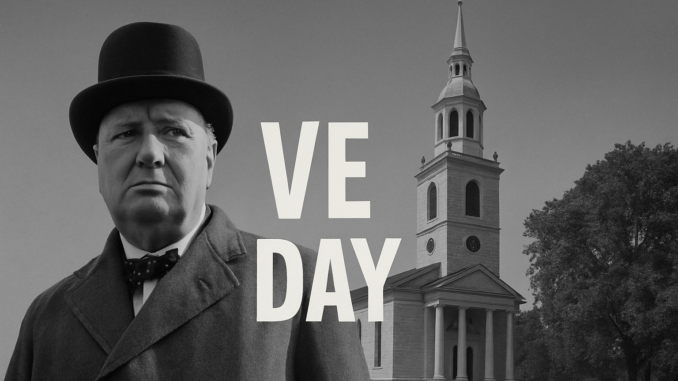
On 8 May 1945, the world witnessed the long-awaited end of hostilities in Europe. Victory in Europe Day—VE Day—marked the formal acceptance of Nazi Germany’s unconditional surrender by the Allied forces, concluding a chapter of unprecedented suffering, destruction, and global upheaval. For millions, it was a moment of relief and celebration. For others, it was a time of mourning, reflection, and a sobering reminder of the terrible cost of war.
As the British Honorary Consul to Missouri, and as a Churchill Fellow at Westminster College—the site where Sir Winston Churchill delivered his iconic “Sinews of Peace” address in 1946—I am keenly aware that VE Day is not merely a commemorative occasion. It is a clarion call to remember and to learn.
Westminster College, home to the National Churchill Museum and the rebuilt Church of St Mary the Virgin, Aldermanbury, serves as a beacon of remembrance. That Churchill chose Fulton, Missouri, to deliver his “iron curtain” speech speaks volumes about the deep and enduring relationship between the United Kingdom and the United States. He recognized that the post-war peace would require not only military victory, but moral clarity, sustained vigilance, and transatlantic unity.
Churchill once said, “Those who fail to learn from history are condemned to repeat it.” These are not idle words. They are a warning. The Second World War was not inevitable. It emerged from a failure to confront aggression, from economic despair, from unchecked nationalism and disinformation. It was enabled by the complacency of democracies and the ruthlessness of totalitarian regimes. Millions perished because good people hesitated to act, or believed that the unimaginable could not happen again.
Today, with the passage of time, the voices of those who lived through those years are fading. But the responsibility to carry their lessons forward falls to us. We must guard against the amnesia of comfort. We must challenge falsehoods and hate. We must remember that peace is not the absence of war, but the presence of justice, of freedom, and of shared responsibility.
VE Day reminds us of the stakes. It reminds us that democracy is fragile, that freedom must be defended, and that tyranny must be resisted—early, firmly, and together. The world of 2025 faces its own trials: the rise of authoritarian regimes, the distortion of truth, the erosion of civil discourse, and the testing of global alliances. These are not new threats. They are echoes of history.
The UK and the US, standing shoulder to shoulder, have long been champions of a rules-based international order, of individual liberty, and of human dignity. We must continue to be. The transatlantic relationship is not merely historical—it is essential to the preservation of peace and the promotion of democratic values around the world.
In Missouri, where Churchill’s voice once rang out with prophetic warning, we hold a special responsibility to remember his message and carry it forward. The rebuilt London church that now stands in Fulton, transported stone by stone from a city ravaged by the Blitz, is a profound symbol. It is a physical link between past and present, between sacrifice and renewal.
This VE Day, let us honour those who gave their lives not only with ceremonies and wreaths, but with conviction. Let us teach the next generation why this day matters—not as a relic of the past, but as a guide for the future. Let us speak with clarity about the dangers of division and the power of unity.
For as long as we remember, we resist the darkness. For as long as we act, we uphold the peace they died to secure.